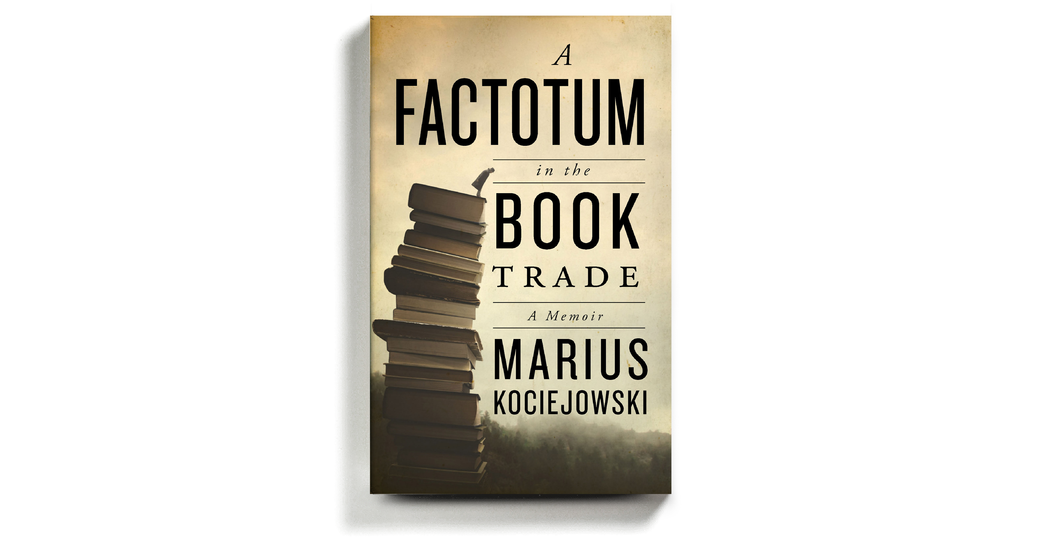
A FACTOTUM IN THE BOOK TRADE
A Memoir
By Marius Kociejowski
349 pages. Biblioasis. $18.95.
I love the smell of old books. More than once, I’ve said those seven words aloud after entering a used and/or rare bookstore. It’s a mistake I won’t make again.
In his dyspeptic new memoir, “A Factotum in the Book Trade,” Marius Kociejowski, who has worked in some of London’s best antiquarian bookstores, turns me into a kebab when he writes:
There is a breed of Homo sapiens that will walk inside, take a deep breath, and say, “Mmm, I just love the smell of old books.” They are to be got rid of as quickly as possible, with whatever violence it takes. I have heard the line a thousand times and never, never have I sold a book to any one of those people.
Barely recovered from that puncture, I ran headlong into Kociejowski’s next skewer:
Also one must be ruthless with those who ask, “What is the most expensive book you’ve got here?” Often it is the male of the species trying to impress the female.
I winced, having posed that question. Now doubly impaled, I stopped to examine my wounds and gather my wits.
I do buy used books, and I’ve been married a long time, so I decided to acquit myself of these charges on technical grounds, fending off the journalist Heywood Broun’s remark that “a technical objection is the first refuge of a scoundrel.”
I was grateful, however, that I easily passed Kociejowski’s third test of bookstore patrons:
There is an even more objectionable subspecies who with their mobile phones like to photograph each other holding an open book although very rarely are their eyes ever fixed on the page. The punishment for them cannot be too severe.
To the gallows with those monsters.
Many good memoirs have been written by antiquarian booksellers. The best of these, recently, is William S. Reese’s “Collectors, Booksellers, and Libraries: Essays on Americanists and the Rare Book Market” (2018), a restless book under a sleepy title.
(Reese died that same year; his holdings are still being dispersed. His Herman Melville collection, up for auction in September at Christie’s, contains the finest book I can imagine owning: Melville’s heavily annotated copy of Dante’s “The Divine Comedy.”)
“A Factotum in the Book Trade” is memorable because a) it’s well-written, and b) it’s close in touch with the books. Kociejowski, now in his early 70s, never owned his own shop. He struggled financially while raising a family on an employee’s earnings. He simply loved the work because, he writes, “the book trade is a floating world for people of intelligence unsuited for anything else.”
A bonus is that he’s funny. When he told a young woman, a former bookseller, that he was working on this memoir, she said to him: “Go on, young people love reading about old white men selling books.” That kind of comment, over there, is what’s known as taking the piss.
Used book dealers, in my experience, tend to be darkly witty. The Scotsman Shaun Bythell wrote, in his memoir “The Diary of a Bookseller” (2018): “I am putting a mental jigsaw together of what a hobbit looks like, based on a composite of every customer I have ever sold a copy to.”
Kociejowski has published books of travel writing, essays and poems, yet he is “a chronic giggler at poetry readings and indeed, not so long ago, trying to suppress my merriment, I burst a blood vessel in my nose.”
Some other things about him: He grew up in rural Ontario; he has never owned a comb or a mobile phone, though he does own a letterpress; the game of chess broke his heart; the English poet Geoffrey Hill, a longtime friend, dedicated a book to him. He once won a woman’s heart with his “imitation of a henhouse at night.”
He’s right about what a good bookstore should feel like. “I want dirt; I want chaos; I want, above all, mystery,” he writes. “I want to be able to step into a place and have the sense that there I’ll find a book, as yet unknown to me, which to some degree will change my life.”
I know that sort of store — it’s the sort where you wish, browsing, you had a miner’s lamp strapped to your forehead.
These kinds of bookstores are rapidly vanishing, Kociejowski laments, victims of the internet and now Covid. He loathes these new “jumped-up bookshops that masquerade as art galleries with nice little walnut tables.”
He talks a bit about famous customers he’s served, including Patti Smith, who shares his fondness for Robert Louis Stevenson’s essays. Philip Larkin would come in, looking for first editions of his own books. He sold a copy of “Finnegans Wake” to Johnny Depp, who was “trying incredibly hard not to be recognized and with predictably comic results.”
He observes that librarians seem to hate books, eager as they are to perforate and stamp them. He is taught by a good bookseller how to polish books: “Use your fingers, it is the softest leather you can ever find.”
I am not a collector, not really, because I can’t afford to be, but also because I write in my books and bend their spines. I’m with Rachel Cusk, who wrote: “I treat my books like I treat my shoes: The more I love them, the shoddier they become.”
Kociejowski points out that most book collectors are men, and they can emit offensive odors. “They are mostly to be avoided or else kept at a prophylactic distance; they tend to lack social graces and have alarming food regimes; their clothes are oddly tailored.” They tend to be unhappy. Once they seize upon their latest find, it’s on to the next one.
He recalls several important female collectors, including Wendy Rintoul and Valerie Eliot (the second wife of T.S. Eliot), and booksellers, notably Marguerite Cohn and Veronica Watts. He notes that female collectors are rarer because, sensibly, the words on the page tend to be more important to women than “the covers keeping the page in place.”
Like the kinds of bookstores Kociejowski admires, his book has a lot of nooks and crannies. Diversions spin into subsidiary diversions. With its looped intestines, this is not a book for everyone.
But it’s an account of a life well, happily and grouchily lived. “I am not a little proud,” he writes, “in declaring my instincts have served me well.”



